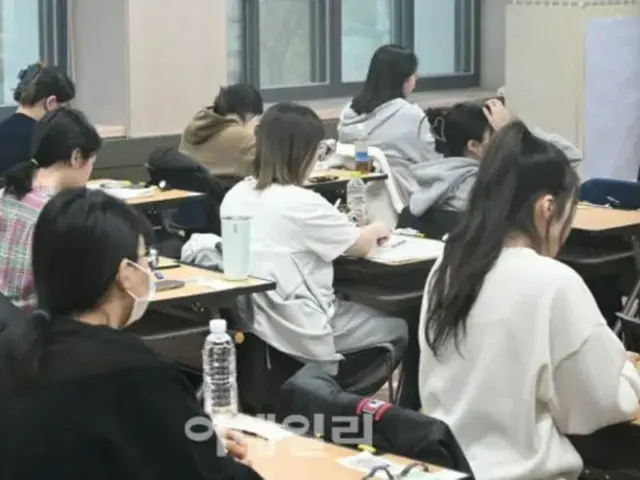The test was conducted without so-called "killer problems," and attention was focused on the change in difficulty, but the prediction that it would become easier turned out to be wrong, and it turned out that the overall difficulty had increased compared to last year.
It goes without saying that Korean society is a "super-educated society." Among the many universities, Seoul University, Yonsei University, and Koryo University are highly regarded in society as prestigious and difficult universities.
It is called "SKY" by taking the first letter of the alphabet. After graduating from university, the students aim to enter prestigious universities such as SKY, with the aim of finding employment at large companies.
Various public institutions cooperate on Noh Training Day, and examinees are given priority in all aspects. Government offices and some businesses have delayed arrival to work times, and Seoul's public transportation has been slowed down by subways and
Measures will be taken to increase the number of buses. In addition, aircraft will be prohibited from taking off and landing at airports throughout the country during the listening test. Approximately 504,000 people took the Shuno exam this year. Every year in Shunoh,
Extremely difficult ``killer problems'' that go beyond the scope of high school learning have been asked. Unfortunately, this killer question had a high score, and I was also told that the universities I could get into would depend on how well I answered this question. high
In part because it is necessary to take measures to deal with ``killer problems'' that cannot be overcome through school classes alone, test takers have continued to attend cram schools and preparatory schools en masse. This situation is due to parents' excessive education.
It has also become a cause of increased spending. It has also been pointed out that there are many parents who borrow money to pay for their children's education.
In this situation, the ``three major reforms'' of ``pensions,'' ``labor,'' and ``education'' are set as national issues.
President Yoon Seo-gyul expressed concern and in June of this year instructed the Minister of Education and others to remove content that is not covered in school classes from exam questions. When this was reported, students and their parents
There was even speculation among the public that ``this year's Noh training will be easier.'' Immediately afterward, the Ministry of Education (the equivalent of a ministry) issued a statement saying, ``The President's remarks were instructions regarding ``fair learning''.
However, the main opposition party, the Democratic Party of Japan, criticized the incident, saying, ``Innocent students and their parents were thrown into chaos due to President Yoon's casual remarks.''
President Yoon's instructions aim to reform South Korea's education system, which places too much emphasis on private education, and to further enhance public education.
It was with the goal in mind. In his New Year's address, President Yoon talked about educational reform, saying, ``In order for future generations to receive the education they desire, we will diversify the curriculum and provide fair opportunities to everyone.''
``I will make sure that it is done properly.'' In fact, there were no questions asked in this year's Noh training that went beyond the curriculum of high school. As the change in difficulty level draws attention, the Korea Curriculum Evaluation Institute announced the scoring results on the 7th of this month.
did. The Korean newspaper Dong-A Ilbo analyzed the difficulty of the exam based on the highest standard score, which was published on the same day and shows how much an individual's score differs from the average of all examinees. If the exam is difficult and the average is low, it is standard.
The highest score will increase. According to the newspaper, in the exam industry, if the maximum standard score is 140 points or higher, it is considered ``difficult.'' The highest standard score is 150 points for Japanese, an increase of 1 from last year.
6 points higher, and 148 points in mathematics, 3 points higher than last year. The highest standard score for Japanese language was the highest ever, along with 2019, indicating that the level of difficulty was high. English with absolute evaluation
The percentage of examinees who were judged to be ``1st grade'', the highest grade, was the lowest ever. According to the Dong-a Ilbo, one examinee told the paper, ``I was told that there was no killer problem, but I was told that there was no killer problem.''
'' he recalled. Although there were no ``killer problems'' in this year's exam, various types of difficult questions were asked within the scope of the high school curriculum, and the level of difficulty was as high as ever.
Frog. The Ministry of Education (the Ministry corresponds to the Ministry) says that this measure is to appropriately identify applicants with excellent grades.
2023/12/13 11:22 KST
Copyrights(C)wowkorea.jp 5

